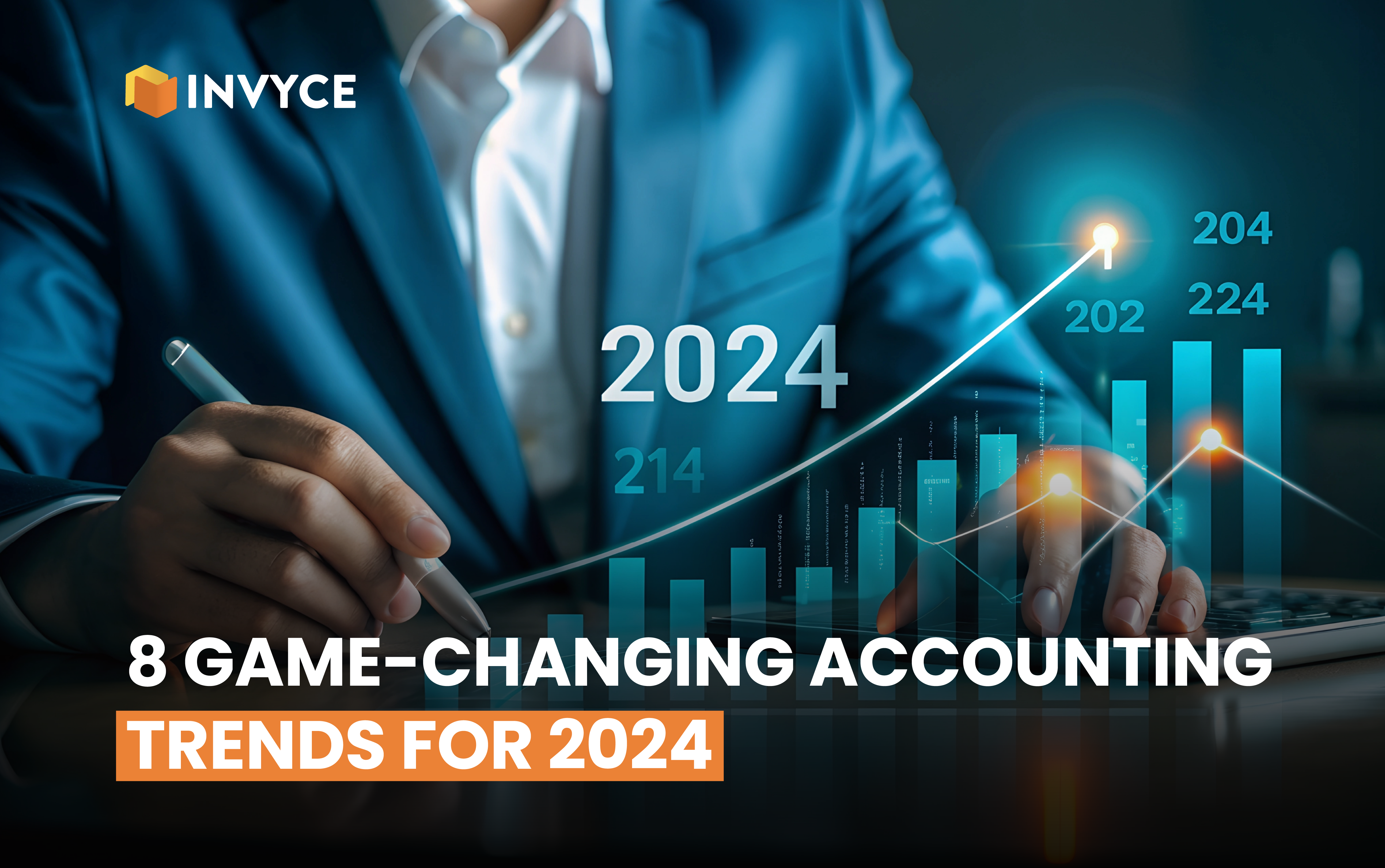06 Aug

The accounting world is changing rapidly, as a result of new technologies and changing business practices. Accountants now play roles that go beyond traditional accounting. To make an impact and stay ahead, it’s essential to follow the trends reshaping the industry. Whether it’s making daily tasks easier, improving security, focusing on sustainability, or strengthening cybersecurity, these trends are transforming how we approach accounting.
In this article, we’ll explore 8 game-changing trends and show you how to use them to keep your business competitive and successful.
1. Advanced AI and Automation
Nowadays, artificial intelligence isn’t just a trend; it is a core component of modern accounting. AI’s ability to process and analyze large amounts of data reshapes how accountants and finance professionals operate. You can harness AI and automation to improve accuracy, speed, and insight in your accounting processes.
How to Implement AI in Accounting?
To implement AI in accounting, begin by automating routine tasks like data entry and invoice processing. This can save time and increase efficiency by using tools that automatically sort expenses, match bank transactions, and alert you to any unusual activity. AI can also improve data analysis by uncovering patterns and trends that aren’t immediately visible, helping you make more informed decisions. It’s excellent for fraud detection too, as it monitors transactions continuously and flags any discrepancies faster than traditional methods. By analyzing data, AI allows you to tailor financial advice to individual clients, adding a personal touch that can set your services apart. Finally, investing in regular AI training for your team is important to ensure they understand how to use these tools effectively and keep their skills up-to-date.
2. Blockchain for Unchangeable Records
Blockchain technology has transcended its origins in cryptocurrency to become a cornerstone of secure and transparent accounting practices. This technology can transform how you manage and verify financial data by offering a decentralized and tamper-proof ledger.
How does Blockchain improve Accounting?
Blockchain improves accounting by providing a secure and efficient way to manage financial data. It streamlines audits by creating a transparent and verifiable trail of every transaction, which saves time and resources while increasing accuracy. The decentralized nature of blockchain improves security by significantly reducing the risk of data breaches, as all transactions are encrypted and cannot be altered. Additionally, blockchain facilitates smart contracts that automatically enforce terms, reducing administrative tasks.
This technology also increases transparency by giving stakeholders access to a clear and trustworthy ledger, building trust and accountability. By exploring industry-specific blockchain solutions, such as those for supply chain finance or property management, businesses can gain a competitive advantage.
3. Rise of Outsourced Accounting
Outsourcing accounting functions is a strategic decision that allows businesses to focus on their core competencies while accessing specialized expertise. It is not just about cost savings but about leveraging the latest technologies and skills.
Steps to Effectively Outsource Accounting
- Identify Key Functions: Determine which tasks can be outsourced, such as payroll processing, tax compliance, or financial reporting. Outsourcing these allows you to concentrate on growth and innovation.
- Select the Right Partner: Choose an outsourcing firm with a proven track record in your industry. Look for partners that offer the expertise and technology your business needs.
- Set Clear Expectations: Establish clear communication and expectations to ensure a seamless partnership. Define roles, responsibilities, and deliverables upfront.
- Monitor Performance: Regularly evaluate your outsourcing partner’s performance to ensure alignment with your business goals. Feedback loops and performance metrics are crucial.
- Utilize Technology: Use cloud-based platforms for seamless data sharing and collaboration with your outsourcing partner. This technology integration can streamline workflows and improve efficiency
4. Cloud-Based Accounting Solutions
Cloud-based accounting solutions have become the backbone of modern financial management, offering unparalleled flexibility, scalability, and accessibility. Moving to the cloud can revolutionize how you manage financial data and collaborate with your team.
How to Utilize Cloud Accounting?
To utilize cloud accounting effectively, start by selecting a poweful platform like Sage Business Cloud, Zoho Books, or QuickBooks Online that suits your specific needs. Consider factors such as features, scalability, and cost when making your choice. Ensure your data is secure by implementing strong security measures like encryption and multi-factor authentication to protect sensitive financial information. The cloud enables real-time collaboration with your team and clients, which can improve productivity and decision-making. You can also scale your operations seamlessly with the cloud, allowing you to expand your business without needing significant infrastructure investments. Lastly, integrate your cloud accounting software with other business applications to streamline workflows and increase efficiency.
5. Focus on ESG Reporting
Environmental, Social, and Governance (ESG) reporting has become essential for businesses demonstrating sustainability and social responsibility. Incorporating ESG metrics into your accounting practices can improve transparency and stakeholder trust.
Steps to Implement ESG Reporting
- Define Relevant Metrics: Identify ESG metrics that align with your business values and industry standards. This could include carbon emissions, diversity practices, or ethical sourcing.
- Utilize Reporting Frameworks: Use established frameworks like the Global Reporting Initiative (GRI) or Sustainability Accounting Standards Board (SASB) for consistent and comparable ESG reporting.
- Engage Stakeholders: Involve stakeholders in defining ESG goals and reporting processes to foster trust and collaboration.
- Communicate Impact Transparently: Share your ESG efforts and achievements with investors, clients, and the public, emphasizing your commitment to sustainability.
- Integrate ESG into Decision-Making: Incorporate ESG considerations into financial and strategic planning to balance profitability with responsibility.
6. Data Analytics for Strategic Insights
Data analytics is revolutionizing how accountants and finance professionals approach decision-making. Advanced analytics tools can transform raw data into actionable insights that drive strategic growth and efficiency.
How to Utilize Data Analytics?
To utilize data analytics effectively, start by using business intelligence tools like Tableau, Power BI, or Looker to visualize complex data and uncover trends. These tools help you see patterns that might not be obvious at first glance. Use predictive analytics to anticipate market changes and adjust your strategies to stay ahead of the competition. You can also improve your financial forecasting by analyzing historical data and predicting future trends, which improves planning.
Understanding customer behavior is another key aspect; by analyzing customer data, you can learn about buying habits and preferences, allowing you to customize your marketing and pricing strategies. Finally, use analytics to identify inefficiencies and areas for improvement within your organization, which can lead to cost savings and better overall performance.
7. The Shift to Remote Work
Remote work has become a permanent fixture in the business world, reshaping how accounting teams operate. Adapting to remote work can improve productivity and employee satisfaction, offering flexibility and access to a broader talent pool.
How to Adjust to Remote Accounting?
To adjust to remote accounting, start by using cloud-based accounting software that allows you to access financial data and collaborate with your team from anywhere. This ensures that your operations run smoothly no matter where you are. improve communication by using platforms like Slack, Microsoft Teams, or Zoom to keep everyone connected and informed, creating a collaborative work environment.
Ensure data security by implementing strong measures to protect financial information from cyber threats, especially when accessing data remotely. Monitor productivity by using project management tools like Trello or Asana to track team performance and ensure everyone stays accountable. Finally, foster a remote work culture by building trust and giving employees the resources and support they need to succeed in a remote setting.
8. Focus on Cybersecurity
As cyber risks grow more complex, cybersecurity has become a top priority in financial management. Protecting sensitive financial data requires a proactive approach that combines technology and human awareness.
How to Improve Cybersecurity?
To improve cybersecurity, start by implementing Multi-Factor Authentication (MFA), which adds an extra layer of protection by requiring multiple ways to verify a user’s identity. This makes it harder for unauthorized users to access financial systems. Regularly update your accounting software and systems to protect against security vulnerabilities and cyber threats. Staying current with updates helps patch any security flaws. Conduct regular cybersecurity audits to identify potential weaknesses and evaluate how effective your current security measures are. When you find any issues, address them quickly to keep your systems safe and secure.
Conclusion
The accounting industry is undergoing an exciting transformation, and keeping up with these changes is essential to staying relevant and successful. By implementing these game-changing trends, you can improve your accounting practice and offer more value to your clients. Automating tasks, securing data, outsourcing to focus on core activities, and integrating ESG into your reporting are just a few ways to improve and adjust. Staying alert and accepting change will help you meet challenges and seize new opportunities. By integrating your strategies with these modern demands, you’ll be well-prepared for a future where accounting plays an important role in driving business success.
Marjina Muskaan has over 5+ years of experience writing about finance, accounting, and enterprise topics. She was previously a senior writer at Invyce.com, where she created engaging and informative content that made complex financial concepts easy to understand.
Related Post
Copyright © 2024 – Powered by uConnect



Marjina Muskaan